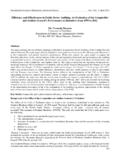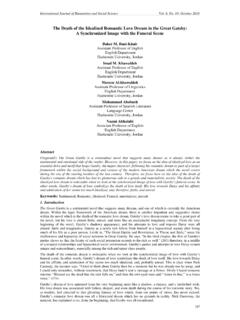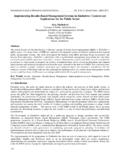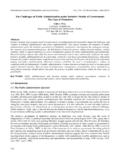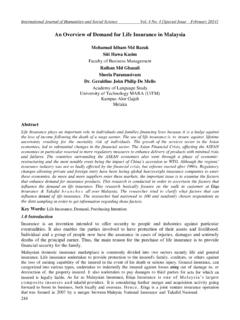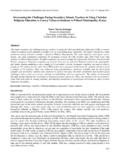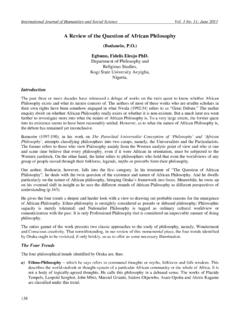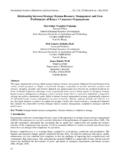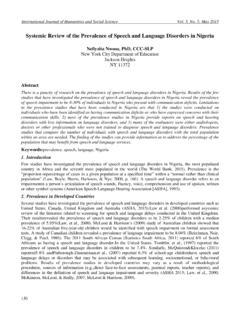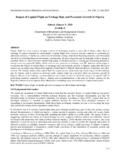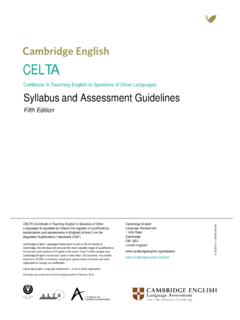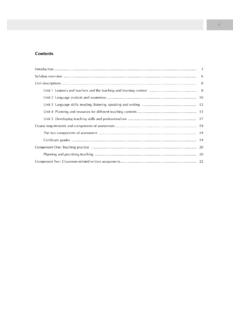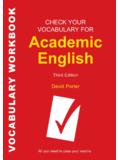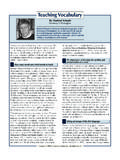Transcription of Vocabulary Acquisition in Second Language - ijhssnet.com
1 International Journal of Humanities and Social Science Vol. 4, No. 13; November 2014 51 Vocabulary Acquisition in Second Language Prof. Dr. Sandra Maria Leal Alves Prof. Dr. Fl via Medianeira de Oliveira Universidade Federal de Pelotas Pelotas, RS Gomes Carneiro Street, 01 Brazil Abstract This article aims at compiling and presenting some results of recent studies about strategies of foreign Language teaching, focusing on Vocabulary Acquisition from data reported in studies by several authors. After carefully considering the outcomes presented by researchers, it was organized a list of learning strategies that were tested by them as well as the results obtained. Keywords: Foreign Language - Acquisition - Teaching Strategies- Vocabulary 1. Introduction Teaching a foreign Language in Brazil is a tough task. As in most developing countries, public schools invest their efforts to teach the mother tongue, leaving foreign languages for private schools that hold a minority student population.
2 The difficulties reported by institutions that do not invest in teaching foreign languages are very similar: the high cost of materials, the difficulty in hiring skilled staff, the lack of interest of the target audience, etc. Within this context, we decided to review the matter, seeking information about Vocabulary strategies for teaching a Second Language on seven authors who carried out researches on Second languages learning. Studies in the area of Second Language Acquisition (L2)1 are very important. They allow the discovery of strategies for teaching Second Language that contribute to the development of learners and facilitate teachers work. In public schools of developing countries, the brainpower and material resources are scarce. Within the wide range of pedagogical approaches, we will focus our review on studies that examine the relevance of teaching strategies related to the Acquisition of Vocabulary in Second Language .
3 This review article seeks 1) describe some recent results of studies about foreign Language teaching strategies, focused on Vocabulary Acquisition and then 2) compile this information, organizing a roadmap of strategies for Second Language instruction. Among the authors who deal with this issue, we chose the studies of Qian (1996), Rott (1999), Barcroft (2006, 2009), Webb & Kagimoto (2009), Catal n & Alba (2009), and Lee (2009) to present the data. Finally, 3) after carefully analyzing the elements presented by these researchers, we present a list of learning strategies that have been mentioned by them. 2. Literature Review Several variables can be identified on the difficulties faced by Second Language learners. All of them are somehow dependent on factors such as socioeconomic, ideological and cultural conditions beyond their own teaching /learning and the intellectual characteristics of learners.
4 Research methods seek to address these different aspects and each researcher, from his/her point of view, analyzes groups of informants in an attempt to give contributions to solving the problem. 1 Second Language Acquisition (L2) is when the person learns another Language in his/her own country. Center for Promoting Ideas, USA 52 Qian s study (1996) was designed to verify whether L2 words encountered in context are better retained than those presented through descontextualized instruction in the form of a word list. Specifically, the study attempted to find out: i) between the two learning techniques, namely, learning Vocabulary in context and learning Vocabulary in isolation, which one is more effective in terms of the retention of target words and ii) what are the levels of immediate, one-week, and three-week retention of Vocabulary learned in context and in isolation.
5 The sample selected by the author consisted of 63 Chinese young adult learners at a major Chinese university who were attending a first-year university English as a foreign Language (EFL2) course. The students were tested in two parallel classes taught by the same teacher, an experienced instructor with a near-native command of English. The classes were organized based on the university s assessment of the students EFL levels at the beginning of the semester. In this experiment, the two classes were treated as two groups: one group (n=32) learned new words in a contextualized situation and the other (n=31) in a descontextualized situation. In order to make the present study comparable to earlier studies on Vocabulary retention, the author followed Anderson &Jordan s methodology (1928). The data selection was carried out in five steps: pretest, instruction, recall 1, recall 2, recall 3.
6 In short, the results of the present experiment showed that the effect of descontextualized Vocabulary learning on later recall is clearly stronger than contextualized Vocabulary learning. The Second study analyzed, Rott (1999), aims at answering three research questions i) do intermediate foreign Language learners acquire Vocabulary incidentally through reading? ii) if acquired, is Vocabulary retained over a longer period of time: 1 week later and 1 month later? and iii) does frequency of exposure to a lexical item have an effect an incidental Acquisition and retention of Vocabulary ? Rott selected 95 learners of German as a foreign Language , all of them in the fourth-semester at the University of Illinois. To test them, the author used 12 lexical items selected as target words (TWs), which are related to items and actions of everyday life (but did not entail new target culture-specific concepts for learners).
7 To certify that the words were unfamiliar for participants, she offered them a list of 50 lexical items (12 TWs and 38 distracters) and she instructed them to attempt a translation of each of the words and skip only those items they had never encountered before. After that, she wrote six different paragraphs using this 12 TWs following some criteria as the same extension and unit of content (for example, the ideas in each paragraph were developed clearly, with concrete subjects and situations). The participants were exposure 2, 4 or 6 frequencies with texts. Then, she presented for them the same list of words used in the pretest to verify the effective gain of Vocabulary . They repeated the supply-definition task, whose results indicated that two encounters with unknown words while reading can be considered a significant gain in Vocabulary , but more significant results for learning and retention of news words can be better observed in six meetings with these items.
8 In 2006, Barcroft examined the effects of word writing on Second Language Vocabulary learning. Two experiments were conducted with 20 Native American participants, learning Spanish as a Second Language , enrolled in a Second -semester Spanish class, in a public university in the Midwestern of the United States. Experiment one consisted of each participant attempting to learn 12 words in the word-writing condition and 12 words in the non-writing condition during word-picture Vocabulary learning. The experiment included a pretest, a Language background questionnaire, a worksheet with general instructions, 24 numbered flashcards for the learning phase and 24 numbered flashcards for testing, an audiotape, a word-writing worksheet and posttest. The 24 words consisted of concrete nouns that were presented twice for 6 seconds for the non-writing condition. In the word-writing condition, participants were instructed to write each word once in the appropriate numbered box on the worksheet.
9 2 English as a Foreign Language (EFL) is when a foreign person studies another Language in another country. International Journal of Humanities and Social Science Vol. 4, No. 13; November 2014 53 Experiment two was a partial reapplication of Experiment 1 with the participation of the same classes in a private university in the Midwestern of the United States. Differently of the first experiment, the researcher used a computer-based presentation program and he had 46 Spanish students. The findings of both experiments indicated that copying target words negatively affected productive L2 Vocabulary learning. In this study, word-writing scores were approximately times lower Experiment 1 and times lower Experiment 2 than non-writing scores. The present results suggest that forcing learners to produce output without access can detract from learning new L2 words.
10 Barcroft (2009) examined the effects of synonym generation on Second Language learning during reading in incidental3and intentional4 Vocabulary learning context with Spanish-speaking adults learners of L2 English at low and high intermediate levels. The participants were 114 Spanish-speaking university students learning L2 English in a university in Mexico City. Without receiving instructions that the experiment was about Vocabulary learning, data were collected in regular classroom following the procedures: all of the participants received one learning packet which corresponded to one of the four learning conditions i) incidental; ii) intentional; iii) incidental-semantic; and iv) explicit-semantic. This packet contained a Language background questionnaire, a worksheet with four activities in each the 10 target words for the experiment had been embedded, an activity 2 with instructional worksheets to read a passage for meaning and specific instruction for each learning condition; the passage The date that was not meant to be!
